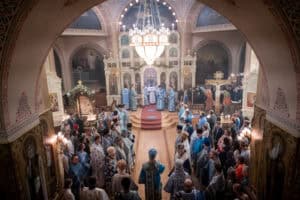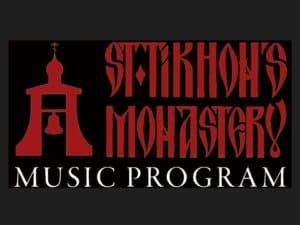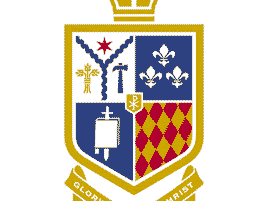2020 PASCHAL MESSAGE FROM HIS GRACE BISHOP PAUL
As I began to reflect on what to write this year during this abnormal and unusual time, a number of scripture verses grabbed hold of me that I want to speak on. The first is from St. Matthew’s gospel.
Then many false prophets will rise up and deceive many. And because lawlessness will abound, the love of many will grow cold. But he who endures to the end shall be saved. (Matthew 24:11-13)
The next is from Psalm 42.
As a hart longs for flowing streams, so longs my soul for you, O God. My soul thirsts for God, for the living God. When shall I come and behold the face of God? My tears have been my food day and night, while men say to me continually, “Where is your God?” These things I remember, as I pour out my soul: how I went with the throng, and led them in procession to the house of God, with glad shouts and songs of thanksgiving, a multitude keeping festival. Why are you cast down, O my soul, and why are you disquieted within me? Hope in God; for I shall again praise him, my help and my God. (Psalm 42:1-5)
The above verses point to a choice to avoid and one to embrace. The one to avoid is something we are facing today. The lawlessness we face in the world especially in the choices we make in how to live our lives has resulted in the love of many growing cold. The pathway to self-centeredness, greed, and self will has resulted in many finding fault with each other instead of loving each other and respecting that each one of us is created in the image of God. Self-justification, and self-righteousness has resulted in people demanding the right to live a certain way. It has also resulted in a pseudo form of righteous behavior that condemns those who don’t live the way they are supposed to live. This is according to a distorted understanding of the gospel we have embraced in how we treat those who don’t live like we do. So the fruit of this lawlessness is that our love for each other has grown cold. During this Lenten season it is my prayer and hope that we have gotten in touch with that lawlessness by which we have lived our own lives and repented. But more importantly I pray and hope that we have repented of the sin of our love having grown cold. This leads me to Psalm 42, which I cited above; and here lies the solution to getting out of this bad habit of living. If we have done what we are supposed to during Lent, and especially in this time where our lives have been drastically affected by the Coronavirus, then there is no better place to be on this Pascha of our Lord than to be thirsting for the living God. Please hear from some of our Church fathers on this theme.
God has everything that will refresh you. He is able to fill anyone who comes to him. This is what I am thirsting for, to reach him and to appear before him. I am thirsty on my pilgrimage, parched in my running, but I will be totally satisfied when I arrive. (St. Augustine on Psalm 42:1)
The person, however, who has once tasted virtue and has come to understand its nature by his own experience of the good is no longer the kind of person who must be dragged away from his passionate attachment to evil by necessity and warning and compelled to look to virtue. On the contrary, he has an excessive thirst for what is superior . . .. He “thirsts” for participation in God more than “the hart” longs for “the fountains of water.” (St. Gregory of Nyssa on Psalm 42:2)
There is a weeping that springs from contemplating eternal good and longing for future light, and tears of joy and desire cannot help but break out as the soul is athirst for the mighty living God. (St. John Cassian on Psalm 42:3)
In God’s home there is an everlasting party. What is celebrated there is not some occasion that passes; the choirs of angels keep eternal festival, for the eternally present face of God is joy never diminished. This is a feast day that does not open at dawn or close at sundown. (St. Augustine on Psalm 42:4)
As tragic as this virus has been and the loss it has brought into our lives, it has also given us the opportunity to return to a way of living our lives that we may have lost sight of; to thirst for the living God because our love has grown cold. Have we been able to experience and believe what Christ said to Martha when he raised Lazarus? “I am the resurrection and the life; he who believes in me, though he die, yet shall he live, and whoever lives and believes in me shall never die. Do you believe this? (John 11:25-26) ” The above words from the gospel of Matthew and from Psalm 42, point to a way that leads to death, and way that leads to life. This way to life is embodied in the words Jesus expressed to Martha at the raising of Lazarus. This brings me to some words from Psalm 104 that are read at all Vesper services.
These all look to you, to give them their food in due season. When you give to them, they gather it up; when you open your hand, they are filled with good things. When you hide your face, they are dismayed; when you take away their breath, they die and return to their dust. When you send forth your Spirit they are created; and you renew the face of the ground (or earth). (Psalm 104: 27-30)
These verses from Psalm 104 point to the Death and Resurrection of our Lord Jesus Christ who God the Father has raised from the dead in the power of the Holy Spirit, having become the first-born of the dead. St. Gregory of Nyssa gives this assurance of the resurrection of the soul and body quoting his sister St. Macrina:
But if you have some fondness for this body, and you are sorry to be unyoked from what you love, do not be in despair about this either. For although this bodily covering is not dissolved by death, you will see it woven again from the same elements, not indeed with its present coarse and heavy texture, but with the thread respun into something subtler and lighter, so that the beloved body may be with you and be restored to you again in better and even more lovable beauty. (Chapter 10, On the Soul and the Resurrection, St. Gregory of Nyssa)
What wonderful words of encouragement and hope St. Macrina by the hand of St. Gregory brings to us. This brings me to the conclusion that we as Orthodox Christians have a living faith, we believe not in the God of the dead but of the living. We heard this from the gospel reading at Tuesday Bridegroom Matins:
And as for the resurrection of the dead, have you not read what was said to you by God, ‘I am the God of Abraham, and the God of Isaac, and the God of Jacob’? He is not God of the dead, but of the living. (Matthew 22:31-32)
Our Lord Jesus Christ conquered the tyranny of death over us through His own life giving Death on the Cross and bringing life to a place where there was no hope. In Christ, death is no more!
And again to Moses: “I am the God of Abraham and the God of Isaac and the God of Jacob.” God “is not the God of the dead,” of those who have died and will never be again. Rather, he is the God of the living, whose souls live in his hand and whose bodies will by the resurrection live again. And David, the ancestor of God, says to God, “You shall take away their breath, and they shall fail and shall return to their dust.” See how it is a question of their bodies. Then he adds, “You shall send forth your spirit, and they shall be created; and you shall renew the face of the earth.” (St. John of Damascus on Psalm 104:27-30)
I don’t know how long we will continue under these restrictions. But I do know nothing can stop us from singing, “Christ is risen from the dead, trampling down death by death and upon those in the tombs bestowing life!”
CHRIST IS RISEN! INDEED HE IS RISEN!
With love in Christ, the unworthy

+PAUL
Bishop of Chicago and the Midwest




